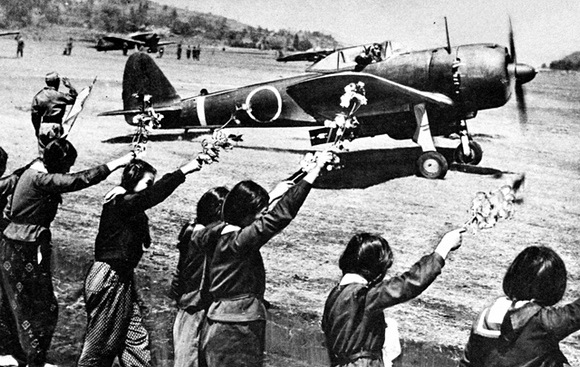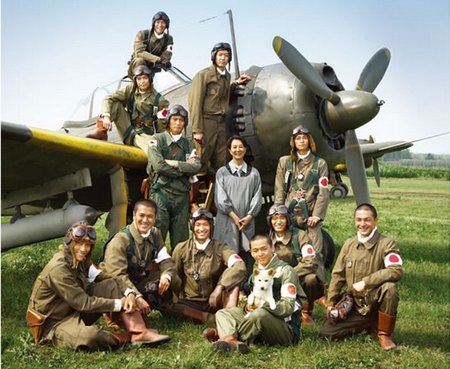Continued from the previous post.
On the upside, For those We Love touches on a theme we don’t see often in Western-made films. I certainly don’t think the American veterans will remember the Kamikaze units with fondness.
The whitewashing and simplification of issues aside, the story does present the Japanese perspective as best it can, and includes little historical notes that I’d previously been unaware – like how Chiran school girls were assigned to the barracks of these units and instructed to take care of the pilots. No – it’s nothing sleazy: the girls cleaned, washed, sewed, and made little mementos for the pilots to take on their missions. The young boys are expectedly bashful around the girls in traditionalist Japan, but enjoy their company and presence.

There’re also touching moments: like the boy who shares with Torihama that he’s about to depart on his suicide mission, but doesn’t have the heart to tell his father. Or the tearful wife who begs to go with her husband in the suicide corps as she doesn’t want to live without him. Or the father who refuses to recognize his daughter-in-law, as he believed that it is not fair to make her so quickly a widow when his son is going on suicide missions.
The film also presents the Japanese military psyche. The Kamikaze pilots are told sternly by their commander “Do not come back alive. Survival is disloyalty!” In one incident, a pilot is chastised, beaten and called a coward because he’s returned several times from missions because of engine trouble, while the rest of his unit have all “accomplished their missions”.
The controversial elements of the film are centered on its portrayal of their opponents. When the Chiran airbase is hit by Allied bombers and fighter planes, there’s a suggestion that the Americans are killers and murderers as some of the Chiran school girls working at the airbase die. The film also includes footage of the Tokyo firebombs, and is bookended by the atomic bomb exploding over Hiroshima. Not very subtle reminders.
—
 Ironically, I’m not too bothered by the Japanese interpretation of the war in this film. While I think a balanced perspective would had been refreshing – and I’m thinking of the German films, and even the South-Korean ones, especially Taegukgi hwinalrimyeo – this is a Japanese production, and it’s just trying to tell their perspective. I can’t fault them for at at least being genuine to what they were sincerely feeling.
Ironically, I’m not too bothered by the Japanese interpretation of the war in this film. While I think a balanced perspective would had been refreshing – and I’m thinking of the German films, and even the South-Korean ones, especially Taegukgi hwinalrimyeo – this is a Japanese production, and it’s just trying to tell their perspective. I can’t fault them for at at least being genuine to what they were sincerely feeling.
And while this film is set in 1945 and present time, it’s not really a war film. It’s a drama with the backdrop of the war, and the theme of the film is set solidly about the almost motherly relationships Tome Torihama enjoyed with the young boys.
My quibbles lie entirely in the pacing. The film moves along dreadfully slowly, and outside some key moments at the start and end of the film is otherwise devoid of music.
Worst of all though is the film’s ending. If you thought the multiple-endings in Return of the King was awful, For Those We Love takes it up another level. The film has a pointless 15 minute-long epilogue that takes viewers from the realistic to the fantastic. It’s completely out of sync with the rest of the film and had me cringing on the sofa. At least I was watching the film while writing my paper – so I didn’t have to listen to the rest of the awful dialog upon seeing where it was going.
Tome Torihama passed away in 1990, and there’re a few web sites honoring her memory and what she did for the Kamikaze pilots.
—
I always look to Ling for film rentals to see what she thinks. In this case, she said the film was so depressing before stopping to feed Hannah. For me, it’s watchable for its tender moments – but get ready your remote to skip the last 15 minutes; or like me, dig up some work to do while waiting for the dull dialog to pass.





Recent comments